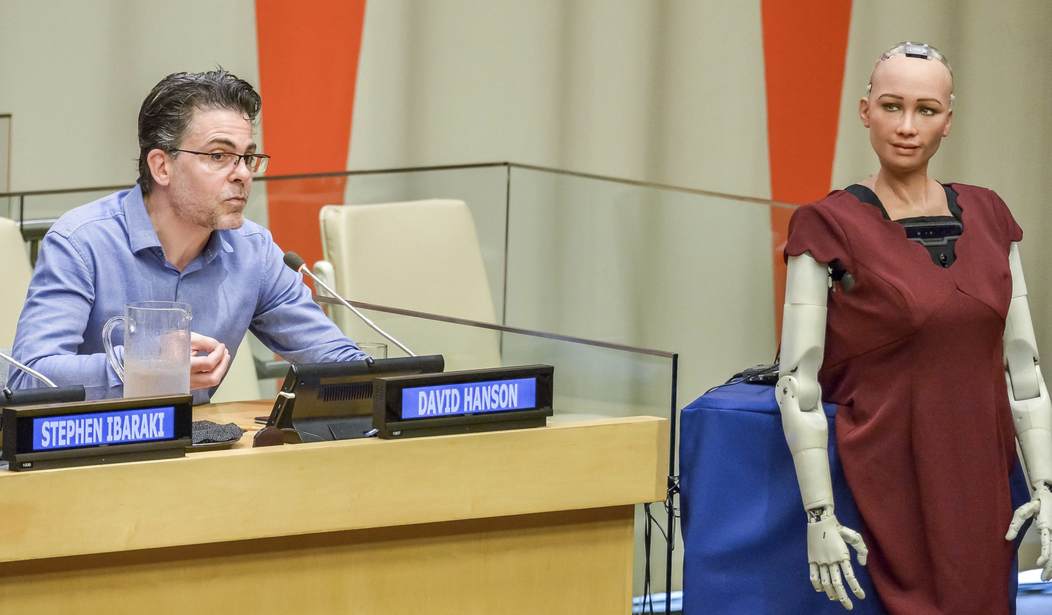CEOs dreaming of replacing their whiny, vacation-taking, sick-day-using human employees with a sleek fleet of never-complaining robots powered by artificial intelligence are going to be disappointed to learn AI is far behind the evolution of human development.
“The public thinks we know how to do far more than we do now,” Raymond Perrault, a scientist at SRI International, told the New York Times.
Artificial intelligence may be smart enough to learn the game of chess or flip hamburgers in a fast-food restaurant. But when it comes to common sense and decision-making skills, AI is way below the bar compared to adult human beings.
The “AI Index” released by Stanford University, the Massachusetts Institute of Technology, SRI International, and other research organizations shows artificial intelligence produced in the United States is no smarter than a five-year-old. And Yann LeCun, the head of AI for Facebook, said even the most advanced artificial intelligence systems are no sharper on the uptake than vermin.
The term “artificial intelligence” has been around since the mid-1950s when science fiction writers fantasized about automobiles that drove themselves, computers that could see, and even phones smart enough to respond to spoken commands.
However, the Stanford-led group that produced the AI index is the first to attempt to create a baseline to measure the technological progress of artificial intelligence.
“In many ways, we are flying blind in our discussions about artificial intelligence and lack the data we need to credibly evaluate activity,” said Yoav Shoham, professor emeritus of computer science at Stanford. “The goal of the AI Index is to provide a fact-based measuring stick against which we can chart progress and fuel a deeper conversation about the future of the field.”
The AI Index found a ton of venture capital money poured into artificial intelligence startup businesses. Active AI startups increased 14-fold since 2000, according to the AI Index report, and VC investment increased six times in the past 17 years.
Ironically, more human brainpower is attracted to the effort to improve the thought processes of artificial intelligence machines.
The AI Index report showed publishing in artificial intelligence grew nine-fold since 2000 and enrollments in the introductory AI-related machine-learning course at Stanford were 45 times higher than at the beginning of the millennium.
Researchers also discovered there are some things — image and speech recognition, object detection, the ability to understand and answer questions and classification of photos of skin cancer cells — that AI machines can do as well, or sometimes better, than a human.
But when it comes to functioning in the real world with anything beyond those rudimentary skills, artificial intelligence falls short.
“AI has made truly amazing strides in the past decade,” Shoham said, “but computers still can’t exhibit the common sense or the general intelligence of even a 5-year-old.”
LeCun said the progress made by his Facebook AI team surprised even Mark Zuckerberg. Facebook’s artificial intelligence software captions photos for vision-impaired users of Facebook and reforms 4.5 billion AI-powered translations a day.
But that doesn’t mean Facebook’s AI machines, or any other artificial intelligence, are even close to being as smart as a kid in kindergarten or the dog he or she plays with after school.
“We’re very far from having machines that can learn the most basic things about the world in the way humans and animals can do,” LeCun told Verge. “Yes, in particular areas machines have superhuman performance, but in terms of general intelligence we’re not even close to a rat.”
LeCun said machines with artificial intelligence have been able to learn chess and Go, and they have even been able to defeat humans at those games. But AI only wins because the systems can play millions of games, and achieve a master level of competency, over the course of a few days or few weeks – something no human could match.
But so far, AI can’t compete with humans in the real world because no one has figured out a way to teach the machines how to build a model of the real world they could run at speeds faster than real time.
The example LeCun used to demonstrate the difficulty in teaching artificial intelligence machines in real-world time is a wake-up call for those who dream of telling a robot to drive their cars.
“If you use a pure reinforcement learning technique, and train a system to drive a car with a simulator, it’s going to have to crash into a tree 40,000 times before it figures out it’s a bad idea,” LeCun said.
One more point LeCun would like to make to journalists and their editors: please stop using pictures from The Terminator at the top of AI articles.
“You see less of that now, and that’s a good thing,” LeCun said. “Occasionally, though you see certain press that raise an issue in a way that reveals a complete misunderstanding of what goes on.”









Join the conversation as a VIP Member